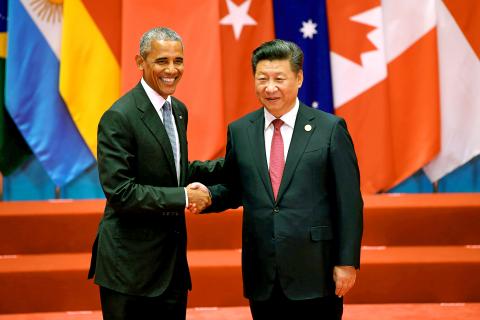US President Barack Obama on Saturday pressed his Chinese counterpart, Xi Jinping (習近平), on territorial disputes in the South China Sea, urging Beijing to uphold its legal obligations and stressing the US’ commitments to its regional allies.
Xi said China would continue to safeguard its sovereignty and maritime rights in the South China Sea, according to a statement on the Chinese Ministry of Foreign Affairs’ Web site.
The two leaders and their delegations met for more than four hours before Obama and Xi talked one-on-one.

Photo: Reuters
After the meetings with Xi and his top officials, Obama emphasized the importance for China to “abide by its obligations” to an international maritime treaty in the dispute over rights to a territory rich in oil and fish through which US$5 trillion in trade travels each year.
The Permanent Court of Arbitration in The Hague, Netherlands, in July ruled that China had no historic claim over the waters of the South China Sea and had infringed on the rights of the Philippines, which brought the case under the UN Convention on the Law of the Sea.
Xi said in his talks with Obama that China “will persist in peacefully resolving disputes through consultations with parties directly involved.”
He urged the US to “play a constructive role” in the peace and stability of the region.
In an unusually lengthy statement following the meeting, the White House said Obama had “underscored the United States’ unwavering commitment to the security of its treaty allies.”
“The president reaffirmed that the United States will work with all countries in the region to uphold the principles of international law, unimpeded lawful commerce, and freedom of navigation and overflight,” the White House said.
China’s foreign ministry, in a separate statement, said the US should drop its “double standards on the South China Sea” and play a constructive role in maintaining regional peace and stability.
Obama stressed the need for a “an open trade and investment environment” and “the need for China to protect religious freedom for all of its citizens,” the White House said.
China rejects criticism of its human rights record, arguing it has lifted millions out of poverty.
Cyber issues, from concern over hacking and cyberespionage to emerging Chinese policies on information technology, have also strained ties.

The combined effect of the monsoon, the outer rim of Typhoon Fengshen and a low-pressure system is expected to bring significant rainfall this week to various parts of the nation, the Central Weather Administration (CWA) said. The heaviest rain is expected to occur today and tomorrow, with torrential rain expected in Keelung’s north coast, Yilan and the mountainous regions of Taipei and New Taipei City, the CWA said. Rivers could rise rapidly, and residents should stay away from riverbanks and avoid going to the mountains or engaging in water activities, it said. Scattered showers are expected today in central and

COOPERATION: Taiwan is aligning closely with US strategic objectives on various matters, including China’s rare earths restrictions, the Ministry of Foreign Affairs said Taiwan could deal with China’s tightened export controls on rare earth metals by turning to “urban mining,” a researcher said yesterday. Rare earth metals, which are used in semiconductors and other electronic components, could be recovered from industrial or electronic waste to reduce reliance on imports, National Cheng Kung University Department of Resources Engineering professor Lee Cheng-han (李政翰) said. Despite their name, rare earth elements are not actually rare — their abundance in the Earth’s crust is relatively high, but they are dispersed, making extraction and refining energy-intensive and environmentally damaging, he said, adding that many countries have opted to

FORCED LABOR: A US court listed three Taiwanese and nine firms based in Taiwan in its indictment, with eight of the companies registered at the same address Nine companies registered in Taiwan, as well as three Taiwanese, on Tuesday were named by the US Department of the Treasury’s Office of Foreign Assets Control (OFAC) as Specially Designated Nationals (SDNs) as a result of a US federal court indictment. The indictment unsealed at the federal court in Brooklyn, New York, said that Chen Zhi (陳志), a dual Cambodian-British national, is being indicted for fraud conspiracy, money laundering and overseeing Prince Holding Group’s forced-labor scam camps in Cambodia. At its peak, the company allegedly made US$30 million per day, court documents showed. The US government has seized Chen’s noncustodial wallet, which contains

SUPPLY CHAIN: Taiwan’s advantages in the drone industry include rapid production capacity that is independent of Chinese-made parts, the economic ministry said The Executive Yuan yesterday approved plans to invest NT$44.2 billion (US$1.44 billion) into domestic production of uncrewed aerial vehicles over the next six years, bringing Taiwan’s output value to more than NT$40 billion by 2030 and making the nation Asia’s democratic hub for the drone supply chain. The proposed budget has NT$33.8 billion in new allocations and NT$10.43 billion in existing funds, the Ministry of Economic Affairs said. Under the new development program, the public sector would purchase nearly 100,000 drones, of which 50,898 would be for civil and government use, while 48,750 would be for national defense, it said. The Ministry of